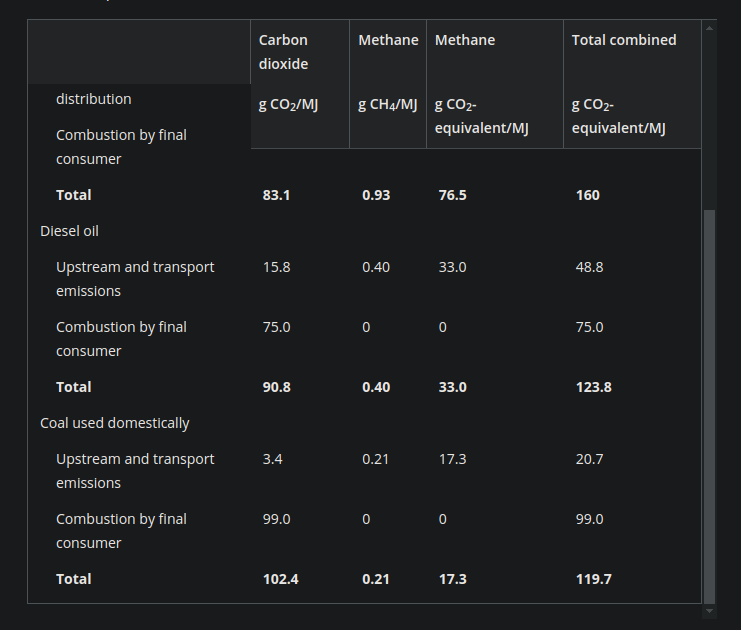The worst part about gas are all the leaks on site. Once it’s in the air, you can’t get it out. Often they don’t even burn the gas and just let it leak straight into the atmosphere. And we didn’t even get to liquifying the product or address the environmental cost of fracking for example. Meanwhile when coal falls off an excavator you just pick it up again.
If you care about the environment, go renewable. Gas isn’t magic and sugar coating won’t clean coal.
Lots of good conversation occurring in this post, but I wanted to call out a bit of nuance on the study that is being glossed over.
The study author’s argument isn’t against methane or even fracking per se. Its against the extra pollution from EXPORTING methane by ships.
I would paraphrase the study author’s position more clearly as: “A ship full of coal produces less pollution than a ship full of liquid methane because of all the leakage and energy needed to make that ship full of methane then back to burnable natural gas”
While the study author does call out leaks and inefficiencies in the extraction of methane, the numbers at that point don’t make coal more attractive. His contention on that only comes when you have to do all the extra work and energy to make it exportable, then consumable at the other side.
The article compares coal and natural gas based on thermal energy and does not take into account the greater efficiency of natural-gas power plants. According to Yale the efficiency of a coal power plant is 32% and that of a natural gas power plant is 44%. This means that to generate the same amount of electricity, you need 38% more thermal energy from coal than you would from natural gas. I’m surprised that the author neglects this given his focus on performing a full lifecycle assessment.
Natural gas becomes approximately equal to coal after efficiency is corrected for, using the author’s GWP20 approach. GWP20 means that the effect of global warming is calculated for a 20 year timescale. The author argues that this is the appropriate timescale to use, but he also presents data for the more conventional GWP100 approach, and when this data is adjusted for efficiency, coal is about 25% worse than natural gas.
I’m not an expert so I can’t speak authoritatively about GWP20 vs GWP100 but I suspect GWP100 is more appropriate in this case. Carbon dioxide is a stable gas but methane degrades fairly quickly. Its lifetime in the atmosphere is approximately 10 years. This means that while a molecule of carbon dioxide can keep trapping heat forever, a molecule of methane will trap only a finite amount of heat. This effect is underestimated using GWP20.
Edit: Also the Guardian shouldn’t be calling this a “major study”. It’s one guy doing some fairly basic math and publishing in a journal that isn’t particularly prestigious.
combined cycle gas powerplants can get almost to 60%
Oh this is an interesting argument.
Yet another study that didn’t bother looking at emissions in mining and processing of coal, just on the ones from natural gas.
Posting this further up for visibility.
Maybe I’m stupid but there’s this table:

It seems like they’re not just counting the combustion emissions in that number.
Then there’s also this, which explicitly talks about fuel development emissions:
The carbon-dioxide emissions just from combustion are substantially greater for coal, 99 g CO2/MJ versus 55 g CO2/MJ for LNG. Total carbon-dioxide emissions from coal, including emissions from developing and transporting the fuel, are also greater than for LNG, but the difference is less, 102.4 g CO2/MJ for coal versus 83.1 g CO2/MJ for LNG (Table 4). This is because of greater energy costs and, therefore, higher emissions of carbon dioxide for developing and transporting the LNG compared with coal. Methane emissions for LNG are substantially larger than for coal, 76.5 g CO2-equivalent/MJ for LNG compared with only 17.3 g CO2-equivalent/MJ for coal (Table 4). As presented in Section 2, this result for methane emissions for coal is quite robust across regions, including China and Poland.55, 56 Consequently, total greenhouse gas emissions are 33% larger for LNG than for coal for the cases of average tanker-cruise lengths, 160 g CO2-equivalent/MJ for LNG versus 120 g CO2-equivalent/MJ for coal (Table 4).
Did you look at the paper or am I grossly misunderstanding something?
What emissions are there from drilling natural gas, aside from aquifer and river pollution?
The main concern with natural gas are that the leaks cause 81x the greenhouse effect than if the gas was just burned. And liquifying methane and tanking it onto ships causes a lot of leaks, more than the leaks caused normally by pipelines. Natural gas is just as bad as coal if not worse.
Coal mining releases a great deal of methane and other green-house gasses. It’s not clear whether it’s more or less than the LPG entire chain.
A serious paper would compare the entire picture of both. Or at least look at one and refrain from opining about the other.
Natural gas is absolutely not as bad or worse than coal, if you look at the whole picture. The big problem with coal wasn’t the greenhouse emissions, it was all the other emissions. Radioactive particulates anyone?
Is this true? Can someone cross-check it?
It’s stated right there on the paper’s abstract.
Maybe I’m stupid but I don’t see that in the abstract. I just see a GWP_20 potential for coal in the abstract. Further down there’s this table:

It seems like they’re not just counting the combustion emissions in that number.
Then there’s also this, which explicitly talks about fuel development emissions:
The carbon-dioxide emissions just from combustion are substantially greater for coal, 99 g CO2/MJ versus 55 g CO2/MJ for LNG. Total carbon-dioxide emissions from coal, including emissions from developing and transporting the fuel, are also greater than for LNG, but the difference is less, 102.4 g CO2/MJ for coal versus 83.1 g CO2/MJ for LNG (Table 4). This is because of greater energy costs and, therefore, higher emissions of carbon dioxide for developing and transporting the LNG compared with coal. Methane emissions for LNG are substantially larger than for coal, 76.5 g CO2-equivalent/MJ for LNG compared with only 17.3 g CO2-equivalent/MJ for coal (Table 4). As presented in Section 2, this result for methane emissions for coal is quite robust across regions, including China and Poland.55, 56 Consequently, total greenhouse gas emissions are 33% larger for LNG than for coal for the cases of average tanker-cruise lengths, 160 g CO2-equivalent/MJ for LNG versus 120 g CO2-equivalent/MJ for coal (Table 4).
Did you look at the paper or am I grossly misunderstanding something?
The idea of calling it “natural gas” was literally just a selling point. It’s basically just naturally occurring methane which we all know is significantly worse than CO2 as a green house gas. And when it leaks it’s virtually undetectable without the right equipment. There have been multiple instances where natural gas just straight up leaks out of a facility and doesn’t get noticed until weeks or even months after the fact.
Yeah that study is probably “true” but very myopic. I believe I commented on this the last time it was posted.
Sure, total co2/ch4 emissions is likely higher. Liquefying and transporting LNG isn’t energy free, while coal is typically burned closer to where it’s mined. I get that’s probably the tact they’re trying to take, fossil fuel still bad and don’t let LNG get too greenwashed.
HOWEVER. The study and article seems to intentionally completely ignore all the secondary emissions of coal. Tallying “emissions” for a picture of true environmental impact is way way way more than just X tons of co2. Burned coal creates a massive amount of atmospheric ash and particulate that is chock full of heavy metals, literal radioactivity, and sulfur/nox that generates acid rain. The tailings from mining and the fly ash from burning is also incredibly toxic and destroys all groundwater for miles and miles around it. It’s just one huge bad flaming lump of cancer that sanitizes entire ecosystems and reduces life expectancy by multiple decades in places where it is heavily used.
Natural gas generates none of this, with the exception of fracking groundwater problems (which, is admittedly a problem, but still way less concentrated than the previously mentioned). A fuel stock of >95% CH4 with the remainder made up of water and longer chain hydrocarbons emits nothing but CO2 and water vapor. Also, combined cycle gas power plants have some of the highest end to end thermal efficiencies of any power plant ever built, which is another huge plus over coal.
So no, it’s not perfect, and its still “bad”. but it is doing a fucking bang good job of not giving people cancer and getting a dirty 18th century energy source out of our modern society where it does not belong.
surely this would been known beforehand?
Unfortunately everything has byproducts and emissions that we do. The only real solution is to reduce, which is difficult given the population and so many third world nations wanting to join a higher standard of living. Natural gas is probably better than coal overall, but on the scale of bad for the environment where 10 is the worst, is an 8 or 9 better? Technically, yes.
Then nuclear is your option, not the option that permanently destroys water tables for billions.
I believe the biggest source of emissions for nuclear actually come from the construction phase, so getting past that, maybe. Still would be preferable to also reduce energy use so that the “better” source can be spread more efficiently.
I believe the biggest source of emissions for nuclear actually come from the construction phase,
While construction would be huge for emissions, I would guess the most emissions would come from the mining, transport, refinement, and disposal efforts for the fuel on an ongoing basis.
There’s emissions for any activity, but the nuclear fuel cycle seems pretty spread out to suggest it’s anything comparable to what the fossil fuel chain of fueling is like.
The Guardian - News Source Context (Click to view Full Report)
Information for The Guardian:
MBFC: Left-Center - Credibility: Medium - Factual Reporting: Mixed - United Kingdom
Wikipedia about this sourceSearch topics on Ground.News
https://www.theguardian.com/us-news/2024/oct/04/exported-liquefied-natural-gas-coal-study





